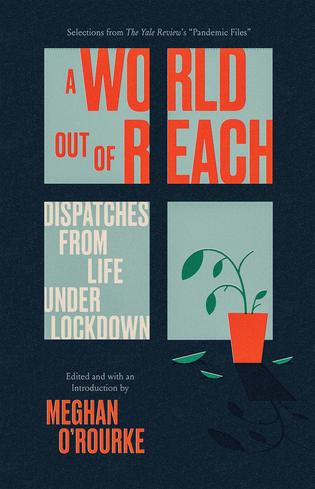
Imagine that, just as Americans were starting to admit to themselves that a pandemic had come to their country, you and your spouse attended a book reading. It’s small and friendly, and you meet a young woman who says she knows a lot about the novel coronavirus. You’re drawn to her, hoping for information. But she doesn’t seem to know anything new. And she finishes her remarks with a gleeful certainty that nothing, nothing at all, can be done—speaking directly at you, smiling. Leaning in very, very close.
This moment takes place in the opening piece of the Yale Review’s new collection of essays and poems about the pandemic, A World Out of Reach (Yale University Press). Fortunately, this particular piece is a work of fiction. But is the young woman a Typhoid Mary? Is she carrying and deliberately spreading COVID-19? The story, by the novelist Katie Kitamura, has the macabre tinge of Edgar Allan Poe. What also caught me was a sentence in the first paragraph: “Although by that point we had already been told not to shake hands, although we had been inundated with warnings not to touch our faces, people were embracing as though we were not on the verge of catastrophe.” That brought back forcefully the slippery, anxious period in mid-March when we were all still clinging to our standard social customs. We went to work, we gathered in elevators, we even shook hands, every one of us knowing but not believing that doing so might kill us.
The collection, edited and introduced by Review editor Meghan O’Rourke ’97, contains 35 short essays and poems. (Kitamura’s is the only piece of fiction.) The writing runs from very good to brilliant, and the brevity of the pieces and their wide scope of topics allow the book a myriad of subjects. It’s organized primarily by time. The four chapters: March, April, May, and June.
In “March,” we start learning from physicians what it takes to do good doctoring when supplies are short. Laura Kolbe writes: “Over the course of two weeks my hospital’s stock of gowns, gloves, masks, and face shields visibly dwindled in every closet. Eventually you had to know whom to ask about secret cabinets. . . . It helped to whisper; it helped to have friends.” Some pages later comes a personal essay by a mother who agonized over lice in her daughter’s hair—a parallel to the invisible infestation of COVID.
In “June” come the piercing first lines of Victoria Chang’s poem: “No mornings are still. / The newly dead move the most.” Further on, we find Yale professor Emily Greenwood’s calm analysis of Thucydides’s writings on the Athenian pandemic of the fifth century BCE. Her closing is unexpected and personal.
Some pieces surprise: “May” includes several fine essays by Yale students—appropriate to the ending of a semester. Many other essays educate: public defender Russell Morse describes how the pandemic has upended and threatened the lives of prisoners. Yale professor John Witt ’94, ’99JD, ’00PhD, gives an absorbing history lesson on US public health emergencies and how “we benefit every day from . . . the first great public health effort” of the 1800s. He also reminds us that “unjustifiable racial and economic inequalities decide who lives and who dies.”
A World Out of Reach is complex. It contains endless shards of information and emotion that can’t be crafted into one single, explicatory tale. But then, so do our own lives. The book’s disjointed subjects and multiple voices speak clearly to the pandemic we are (hopefully) living through.
 loading
loading